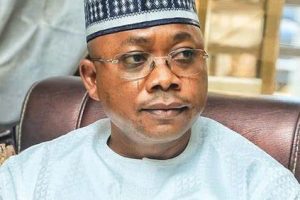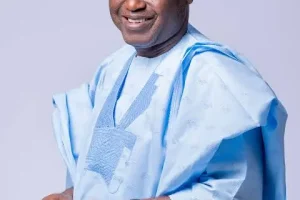Benin City, Nigeria – Governors from Nigeria’s ruling All Progressives Congress (APC) have acknowledged the resignation of the party’s National Chairman, Abdullahi Ganduje, describing it as a “natural step” in the party’s ongoing development. The announcement came from the Progressive Governors’ Forum (PGF) following a two-day strategic meeting in Benin City, Edo State, on Saturday.
The governors, in a communiqué read by PGF Chairman and Imo State Governor Hope Uzodimma, indicated that this leadership change aligns with the party’s broader commitment to internal reforms and adaptation. While no immediate specific details were provided regarding Mr. Ganduje’s departure, the emphasis on “evolution” suggests a strategic repositioning within the party rather than a crisis.
“His Excellency, Dr. Abdullahi Umar Ganduje’s resignation is in tandem with the party’s continued evolution,” the communiqué stated, underscoring what the PGF views as a planned progression within the APC’s framework.
Governor Uzodimma emphasised the forum’s dedication to strengthening party cohesion and promoting people-centred development across Nigeria. He asserted that the APC remains the “most institutionally coherent political platform in Nigeria,” citing its “unmatched records of reforms, electoral success, and national unity.”
Cross-Party Alignment and Economic Focus
A notable development from the meeting was the formal welcome of Akwa Ibom State Governor, Pastor Umo Eno, into the APC fold. The PGF interpreted Governor Eno’s decision, along with his supporters, as a reflection of “a growing national consensus on the transformative policies being executed by President Tinubu’s administration.” This cross-party movement suggests a potential broadening of the APC’s political base.
The governors also undertook a comprehensive appraisal of Nigeria’s economic, social, security, and political trajectory. They expressed satisfaction with what they described as “renewed coordination” between federal and state institutions, deeming it “vital for national progress.”
They specifically commended the prioritisation of fiscal reform, food security, energy transition, infrastructural modernisation, and social sector revitalisation by the current federal administration. The PGF acknowledged the effectiveness of macroeconomic stabilisation policies, including the removal of fuel subsidies, exchange rate unification, and debt rationalisation.
However, while acknowledging signs of economic recovery, the governors stressed the need for growth to be “further democratised.” They called for expanded investments in food security, job creation, poverty eradication, micro, small, and medium-sized enterprises (MSMEs), and social safety nets to ensure inclusive prosperity.
Reaffirming the critical role of sub-national governments as “engines for economic renewal,” the PGF committed to deepening economic decentralisation in line with Nigeria’s 1999 Constitution. They welcomed the increase in fiscal transfers to states and growing investor confidence in Nigeria’s economic outlook, noting that “multiple APC-led states are now attracting significant domestic and foreign direct investments, which is a testament to the enabling environment being created.”
The meeting’s communiqué was signed by Fred Itua, Chief Press Secretary to Governor Monday Okpebholo of Edo State, where the two-day strategic session took place.





Add Comment